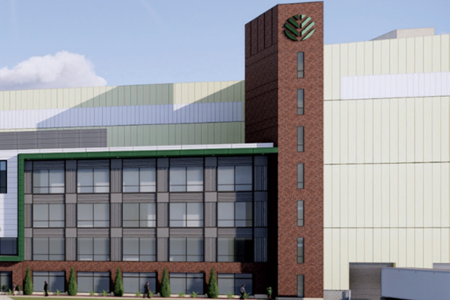
An artist’s rendering of the planned paperboard mill in Waco, Texas. | Courtesy of Graphic Packaging International
Graphic Packaging International is replacing several older recycled fiber mills with a $1 billion facility in Waco, Texas.
The move will increase the company’s North American capacity from 4.2 million tons of paperboard across eight mills to 4.4 million tons across six mills, according to an investment presentation.
The Waco facility will provide 550,000 tons of capacity, more than replacing the 350,000 tons of capacity lost from expected mill closures.
Graphic Packaging International (GPI) recycles secondary fiber into coated recycled paperboard (CRB) and is the largest producer of CRB in North America. CRB is made entirely from recycled fiber, including post-consumer OCC, ONP and mixed paper, as well as cuttings from box plants.
The capital spend is part of a strategy to bring down GPI’s average production cost for CRB.
GPI now has CRB mills in Kalamazoo, Mich.; Middletown, Ohio; East Angus, Quebec; and Tama, Iowa. According to a presentation by company executives, the three machines at GPI’s recently upgraded Kalamazoo mill can make CRB for an average of about $405 a ton, compared with roughly $540 a ton for competitors’ mills.
The Waco mill will be able to produce CRB at a cost on par with Kalamoozoo’s most efficient machine, coming in at less than $405 a ton, the presentation shows.
The mills that will be closed will be the East Angus, Tama and Middletown locations. All handled recycled paperboard. GPI acquired the Tama mill on Jan. 31 of this year.
Michael Doss, president and CEO of the company, said in a statement that “we believe the future of consumer packaging will include more coated recycled paperboard in more places, so we’re taking steps to meet this growing demand.”
The 640,000-square-foot Waco facility will turn corrugated box cardboard into thinner paperboard packaging for cereal boxes and other consumer products, the Waco Tribune reported.
Kris Collins, senior vice president of the Greater Waco Chamber of Commerce, said the city’s location within 200 miles of Houston, Dallas and San Antonio gives GPI ideal access to customers and suppliers.
“Location has been key in this process for them, and we’ve learned through this process that we are at the center of the circular economy,” she told the local paper.
Construction will begin in the first quarter of 2023, with machine commissioning targeted for the fourth quarter of 2025 and start-up expected in the first quarter of 2026.
The facility will have an enhanced drum pulper to clean and separate recycled materials, including up to 15 million paper cups per day. GPI is working with customers to create a paper cup recycling program, Doss said.
It will also have the capability to recycle 100% of internally generated secondary fiber, about 200,000 tons, the financial documents noted.
The $1 billion investment over three years is expected to increase the company’s annual earnings before interest, taxes, depreciation and amortization (EBITDA) by about $160 million. According to the presentation, about $100 million of that expected EBITDA growth will come from mill closure savings and reduced variable input consumption, and the other $60 million will come from optimized mill capacity.


